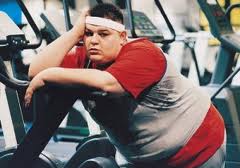Nick Smoot- Owner of Smoot Fitness
Smootfitness.com
I know the winter isn’t the best time to be posting a dieting article (its bulking season bro!), but after recently witnessing many people set unhealthy and extreme fat loss goals, I felt obligated to share my opinion on the subject. Crash diets do not work. For anyone unfamiliar with the term, a crash diet is one in which an excessive caloric deficit is combined with large amounts of cardio, in an attempt to lose a large amount of body fat in the shortest amount of time possible. I can tell you from first-hand experience that this style of dieting is detrimental to your health, unmaintainable, leads to rapid rebounds in bodyweight, and makes it much harder for you to lose fat in the future. If safe, efficient, and maintainable fat loss is your goal, crash diets are not for you.
Health Risks
I want to touch briefly on the potential health risks of rapid weight loss. No matter your performance or physique goals, optimal health should be your top priority. Now the main problems I experienced when I decided to crash diet were muscle/strength loss, a lowered immune system, hormone dysfunction, a slowed metabolism, lack of energy, malnutrition, and the development of a poor relationship with food. This obsession with food quickly escalated in to an eating disorder, which did nothing but enhance all of the other problems.
These are not the only problems associated with rapid weight loss; they are just the major ones that I and the majority of other people who crash diet experience. I know rapid weight loss is enticing; after all, who wants to diet for 16+ weeks? However, the harm of these programs far outweighs the benefits, and the health problems that result from these diets still haunt you many years down the line.
Why Crash Diets Fail
There are two reasons why crash diets fail: the body adapts to a stimulus very quickly, and adherence to an extreme fat loss protocol is very low.
The main variables that can be manipulated to stimulate fat loss (assuming that we are engaged in a properly designed resistance training program) are cardio and dietary intake. Now it does make logical sense that the larger the caloric deficit and amount of cardio we perform, the faster our rate of weight loss will be. So we cut our food intake in half, start performing an hour of cardio six days per week, and our weight starts to plummet. It’s only been two weeks and we can almost see our genitals in an upright position? Those losers taking 5 months to diet need to get on our level!
 But then our weight loss comes to a screeching halt. Our body is a survival machine that adapts to whatever stress is placed on it, and whether the stress is small or large, our metabolism will slow and our bodies will become more efficient at performing exercise within just about the same amount of time. From my own dieting experience and from working with clients, these adaptions seem to take place anywhere from four to eight weeks.
But then our weight loss comes to a screeching halt. Our body is a survival machine that adapts to whatever stress is placed on it, and whether the stress is small or large, our metabolism will slow and our bodies will become more efficient at performing exercise within just about the same amount of time. From my own dieting experience and from working with clients, these adaptions seem to take place anywhere from four to eight weeks.
So we have gotten nowhere close to our fat loss goals, but are now forced to maintain these extremely low food intakes and high physical outputs just to maintain the small amount of weight that we did lose. That sucks!! Pull any more calories and we risk malnutrition; Increase cardio and our rate of muscle loss will be more severe than it already has been. We are stuck, it’s extremely frustrating, and adherence goes flying out of the window. We eventually just give up, say “screw this dieting crap,” and go back to what we were eating before.
But wait a second; our metabolism is much slower now, so we should probably increase our food intake slowly in order to allow our metabolism to catch up right? Not going to happen! We are at the point where broccoli makes us gag, and getting tazed until we soil ourselves sounds like a much better idea than running on a treadmill. We abandon cardio completely, and jump right back to the food intake we were at before. A wrecked metabolism combined with an overabundance of food and no physical activity? That has “Fat Storage” written all over it.
We gain weight (and usually surpass the level of body fat we were at before), decide we can’t stand the way we look or feel, and decide to start dieting all over again. And this vicious cycle continues to repeat itself. Eventually we get to a point where our metabolism is at dangerously low levels, our body is over trained, our hormones are all out of whack, and we are heavier now that we have been at any other time in our lives. And once you get to this point, it is a long and arduous road to recovery. Do yourself a favor and diet properly. Dieting slow may not provide drastic and noticeable results, but it’s much healthier, leads to better adherence, and helps you maintain most (if not all) of your lean body mass. If you make the decision to crash diet, you’re admitting defeat before the fight has even begun.
The Proper Way to Lose Body Fat
Fat loss is relatively simple. You start with a slight caloric deficit through either diet or exercise, and make subtle changes to either variable each time you hit a fat loss plateau.
With dietary intake, you want to start as high as possible. If you haven’t seen Dr. Layne Norton’s YouTube Videos on Metabolic Damage, I highly recommend them. Aim to maximize your metabolic capacity during the offseason so that you end your diet on a relatively high amount of calories. Start with a deficit of about 250 or 300 calories from your maintenance caloric intake, and make very small adjustments each time you hit a plateau.
As far as cardio is concerned, it needs to be used sparingly. Everything is situational, but I generally like to start myself and my clients with one or two days of cardio for 30 minutes per session. Any more than that is really unnecessary unless you are an endurance athlete or have a weight loss deadline that you need to hit. When fat loss stalls (and you don’t want to decrease calories), simply add another cardio session, increase the duration of your current cardio sessions, etc. At the end of the day, if you are engaged in a heavy resistance training program 3-5 days per week, proper and timely manipulations of dietary intake should be enough for you to reach your fat loss goals while keeping your total amount of cardio relatively low.
Summary
I hope after reading this article you will think twice about implementing a crash diet. Training and nutrition should be viewed as a lifestyle, and in the words of Sohee Lee (Coach from Team Norton), “if you can’t see yourself maintaining your eating habits five years down the line, something needs to change.” Fat loss is not linear, and plateaus are inevitable. The higher your calories are in the beginning, the more you have to pull from when fat loss stalls. No matter how much weight you need to lose, maximize food intake, minimize cardio, make small adjustments, and stay patient. Do this and not only will you maintain your health and maximize performance, but you almost guarantee your success in reaching your ideal physique.
Like What You See?
Get the Smoot Fitness Guide to Getting Stronger - FREE.



Leave a Reply